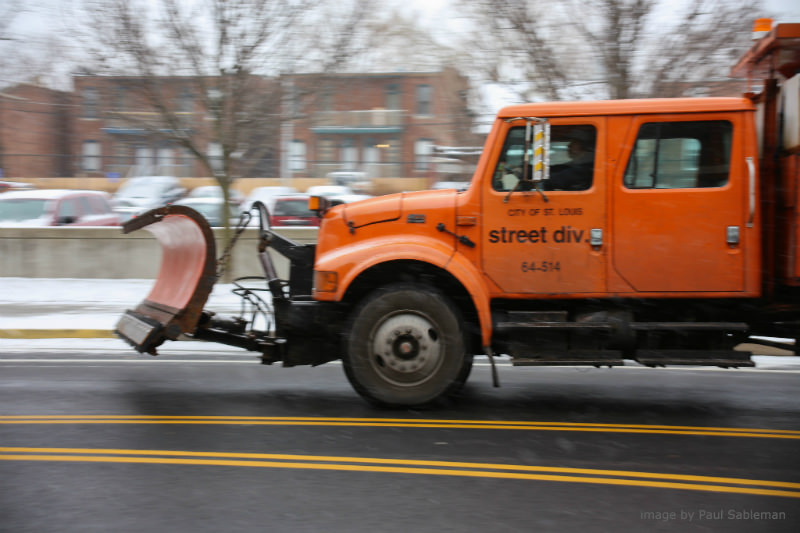
Tomorrow, August 4th, voters in St. Louis will consider a general obligation bond issue authorizing up to $180M in new debt backed by a property tax increase. The vote marks the first time since 1999 the City has gone to voters for a substantial and wide-ranging bond issue to pay for capital needs. The City Charter requires 2/3rds voter approval for passage.
As a representative on the Capital Committee, I’ve been involved with the development of a Capital Needs Inventory for the City since 2013. The list covers most areas of local government including the Fire Department and EMS, Police, Corrections, Courts, City Buildings, Streets and Bridges, and Rolling Stock (vehicles).
While the Capital Committee ultimately approved the list, most line items on the list came from a deliberative process led by the City’s budget division, department heads, facilities management personnel, and Board of Public Service (the name of our public works division.) The list is specific where possible (replace a Trash Truck purchased in 2000, replace air conditioner units at 1520 Market) but more general where necessary (roof repairs to fire houses). The overall theme is replacing expensive but necessary vehicles like aging fire trucks, ambulances, and trash trucks, while also taking on deferred maintenance projects like the leaking roof at City Hall and the damaged water line underneath 1520 Market St. (our City Hall West Building).
The critical needs list we created is long, but rarely flashy. Most items included ensure the City’s more than 6,000 employees have the buildings, equipment, and vehicles necessary to provide the services residents want and need. Between car accidents, medical emergencies, and fires, our fire trucks and ambulances are constantly running. Trash trucks are out picking up trash every weekday. These vehicles ensure residents get quality basic services. The vehicles that enable these services are aging. When a 15 year old trash truck breaks down while on a route, it means dumpsters may not get emptied that day.
St. Louis does, in fact, budget for some of these vehicles on an annual basis. But given the cost of some of them ($250,000 for a trash truck or ambulance, $975,000 for a typical fire truck) and their service life (10 to 20 years) rolling them into a bond issue makes sense. When I discussed this bill on the floor of the Board of Aldermen in May, I used some of the time just to list the mundane, yet essential, investments and upgrades passing the bond issue would enable: (Discussion begins at about 31:00)
In addition to city facilities, vehicles, road, and bridge projects, the bill also breaks some new ground in local policy. For the first time, a Land Reutilization Authority (the owner of last resort for abandoned property) stabilization fund would be established. For decades the City has struggled with an inventory of properties acquired through tax delinquency. Many of the properties without an immediate private sector buyer fall into further disrepair and are eventually demolished when they become public safety hazards. Maintenance is generally limited to boarding exterior doors and windows, but a stabilization fund would allow enough investment to mothball and water-proof key structures so they can weather a period of vacancy until a private sector development can bring them back to life.
In addition, the bond provides an additional $4M in funding to our existing home repair program. Low and moderate income homeowners, including many senior citizens, can access the program to provide essential repairs to their living space. While in recent years the City has authorized generous tax incentives for projects like Ballpark Village and Ikea, this program is the other side of the coin. It provides direct assistance to residents who need it, often helping seniors stay in healthier homes or families repair costly items like a broken sewer lateral. The addition of $4M will help reduce the waiting list of homeowners the program continually faces.
A relatively small portion of the bond list has generated the most discussion. $15M is earmarked for road infrastructure around the potential NGA relocation site north of Pruitt-Igoe. As the bond issue was debated over the course of a year, that line item was refined in the language of the bill to only be issued if NGA selects the site north of downtown. If NGA exits the City for another location, the total bond issue shrinks to $165M.
While I’ve opposed other tax increases like Proposition P in 2012 and Amendment 7 in 2014, I truly believe this bond issue will address the priorities local government must have. By authorizing the bond, residents will ensure continued service from our fire department, EMS, refuse, court, and jail facilities. We’ll also be able to invest substantially in road and bridge projects using the bond funds as a way to access federal money. With recent Complete Streets legislation strengthened, those projects will deliver a more balanced transportation vision for the City. We’ll also break some new ground locally by finally establishing a building stabilization fund. All of this is possible for between $2 and $8 a month for most households.
If it fails, residents will see service interruptions. After two recessions and 16 years since the last bond passage in 1999, many essential city services are on life support. Now is the time to make this investment.

